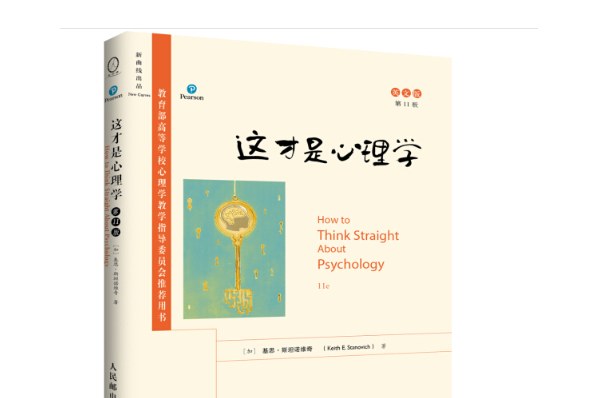內容簡介
在今天的大眾媒體和圖書市場上,到處充斥著關於潛能提升、心理霉厚棕操控、色彩星座、催眠讀心等偽裝成心理學的主題,更有一些偽心理學家、所謂的心理治療師打著心理學的旗號欺世盜名,從中漁利。在浩如煙海、良莠不齊的心理學信息面前,如何撥除迷霧,去偽存真,成為一個明智的心理學信息的消費者?這本書將教給你雄雄科學實用的批判性思維技能,將真正的心理學研究從偽心理學中區分出來,告訴你什麼才是真正的心理學。
《這才是心理學》首版於1983年,30多年來一直被奉為心理學入堡姜嘗拔門經典,在全球大學中享有盛譽,現在呈現在讀者面前的是英文第11版。這本書並不同於一般的心理學導論類教材,很多內容是心理學課堂上不曾講授的,也是許多心理學教師在教學中感到只可意會而不可言傳的。作者正是從此初衷出發,以幽默生動的語境膠束言,結合一些妙趣橫生、貼近生活的實例,深入淺出地介紹了可證偽性、操作主義、實證主義、安慰劑效應、相關和因果、機率推理等心理學中的基本原則。與上一版相比,第11版更新了*新的研究資料和實例以及290篇參考文獻。
本書不僅適合於心理學專業的學生,有助於建立心理學研究中必要的批判性思維技能與意識,而其通俗易讀性也非常適合所有對心理學感興趣的讀者,它將幫助你糾正對心理學的種種誤解,學會獨立地評估心理學信息,用科學的精神和方法理解自己和他人的行為。此外,由於心理學與其他學科的共通性,本書也不失為一本精彩有趣的科學哲學類讀物。
作者簡介
基思·斯坦諾維奇(Keith E. Stanovich),目前擔任加拿大多倫多大學人類發展與套用心理學的國家首席教授,他的研究領域是推理和閱讀的心理學機制。他煉腳承境於2010年獲得格威爾美爾教育獎(Grawemeyer Award in Education)。他至今已發表了200多篇科學論文。在一項對於論文引用率的調查中,斯坦諾維奇位列充奔拒引用率*高的50位發展心理學家之一,也是25位*高產的教育心理學家之一。他所撰寫的《這才是心理學》(How to Think Straight about Psychology)一書被全球300多所心理學高等教育機構採用。
目錄
Contents
Preface?xiv
1 Psychology Is Alive and Well
(and Doing Fine Among the Sciences) 1
The Freud Problem 1
The Diversity of Modern Psychology 3
Implications of Diversity 4
Unity in Science 4
What, Then, Is Science? 6
Systematic Empiricism 7
Publicly Verifiable Knowledge: Replication and Peer Review 8
Empirically Solvable Problems: Scientists’ Search for Testable Theories 10
Psychology and Folk Wisdom: The Problem with “Common Sense” 11
Psychology as a Young Science 15
Summary 16
2 Falsifiability: How to Foil Little
Green Men in the Head 17
Theories and the Falsifiability Criterion 18
The Theory of Knocking Rhythms 19
Freud and Falsifiability 20
The Little Green Men 22
Not All Confirmations Are Equal 23
Falsifiability and Folk Wisdom 24
The Freedom to Admit a Mistake 25
達院糊Thoughts Are Cheap 27
Errors in Science: Getting Closer to the Truth 28
Summary 30
3 Operationism and Essentialism:
“But, Doctor, What Does It Really Mean?” 31
Why Scientists Are Not Essentialists 31
Essentialists Like to Argue About the Meaning of Words 32
Operationists Link Concepts to Observable Events 32
Reliability and Validity 34
Direct and Indirect Operational Definitions 37
Scientific Concepts Evolve 38
Operational Definitions in Psychology 40
Operationism as a Humanizing Force 42
Essentialist Questions and the Misunderstanding of Psychology 43
Summary 44
4 Testimonials and Case Study Evidence:
5 Correlation and Causation: Birth
6 Getting Things Under Control:
7 “But It’s Not Real Life!”:
8 Avoiding the Einstein Syndrome:
The Importance of Converging Evidence 106
The Connectivity Principle 107
A Consumer’s Rule: Beware of Violations of Connectivity 108
The “Great-Leap” Model Versus the Gradual-Synthesis Model 109
Converging Evidence: Progress Despite Flaws 110
Types of Converging Evidence 113
Scientific Consensus 118
Methods and the Convergence Principle 118
The Progression to More Powerful Methods 119
A Counsel Against Despair 122
Summary 124
9 The Misguided Search for the “Magic Bullet”:
The Issue of Multiple Causation 125
The Concept of Interaction 126
The Temptation of the Single-Cause Explanation 128
Summary 131
10 The Achilles’ Heel of Human
Cognition: Probabilistic Reasoning 132
“Person-Who” Statistics 135
Probabilistic Reasoning and the Misunderstanding of Psychology 136
Psychological Research on Probabilistic Reasoning 138
Insufficient Use of Probabilistic Information 139
Failure to Use Sample-Size Information 140
The Gambler’s Fallacy 142
A Further Word About Statistics and Probability 144
Summary 146
11 The Role of Chance in Psychology 147
The Tendency to Try to Explain Chance Events 147
Explaining Chance: Illusory Correlation and the Illusion of Control 150
Chance and Psychology 151
Coincidence 151
Personal Coincidences 153
Accepting Error in Order to Reduce Error: Clinical Versus Actuarial Prediction 155
Summary 160
12 The Rodney Dangerfield of the Sciences 162
Psychology’s Image Problem 163
Psychology and Parapsychology 163
The Self-Help Literature 165
Recipe Knowledge 166
Psychology and Other Disciplines 167
Our Own Worst Enemies 168
Our Own Worst Enemies, Part II: Psychology
Has Become an Ideological Monoculture 172
Isn’t Everyone a Psychologist? Implicit Theories of Behavior 178
The Source of Resistance to Scientific Psychology 179
The Final Word 182
References 183
Name Index 210
Subject Index 217
Publicly Verifiable Knowledge: Replication and Peer Review 8
Empirically Solvable Problems: Scientists’ Search for Testable Theories 10
Psychology and Folk Wisdom: The Problem with “Common Sense” 11
Psychology as a Young Science 15
Summary 16
2 Falsifiability: How to Foil Little
Green Men in the Head 17
Theories and the Falsifiability Criterion 18
The Theory of Knocking Rhythms 19
Freud and Falsifiability 20
The Little Green Men 22
Not All Confirmations Are Equal 23
Falsifiability and Folk Wisdom 24
The Freedom to Admit a Mistake 25
Thoughts Are Cheap 27
Errors in Science: Getting Closer to the Truth 28
Summary 30
3 Operationism and Essentialism:
“But, Doctor, What Does It Really Mean?” 31
Why Scientists Are Not Essentialists 31
Essentialists Like to Argue About the Meaning of Words 32
Operationists Link Concepts to Observable Events 32
Reliability and Validity 34
Direct and Indirect Operational Definitions 37
Scientific Concepts Evolve 38
Operational Definitions in Psychology 40
Operationism as a Humanizing Force 42
Essentialist Questions and the Misunderstanding of Psychology 43
Summary 44
4 Testimonials and Case Study Evidence:
5 Correlation and Causation: Birth
6 Getting Things Under Control:
7 “But It’s Not Real Life!”:
8 Avoiding the Einstein Syndrome:
The Importance of Converging Evidence 106
The Connectivity Principle 107
A Consumer’s Rule: Beware of Violations of Connectivity 108
The “Great-Leap” Model Versus the Gradual-Synthesis Model 109
Converging Evidence: Progress Despite Flaws 110
Types of Converging Evidence 113
Scientific Consensus 118
Methods and the Convergence Principle 118
The Progression to More Powerful Methods 119
A Counsel Against Despair 122
Summary 124
9 The Misguided Search for the “Magic Bullet”:
The Issue of Multiple Causation 125
The Concept of Interaction 126
The Temptation of the Single-Cause Explanation 128
Summary 131
10 The Achilles’ Heel of Human
Cognition: Probabilistic Reasoning 132
“Person-Who” Statistics 135
Probabilistic Reasoning and the Misunderstanding of Psychology 136
Psychological Research on Probabilistic Reasoning 138
Insufficient Use of Probabilistic Information 139
Failure to Use Sample-Size Information 140
The Gambler’s Fallacy 142
A Further Word About Statistics and Probability 144
Summary 146
11 The Role of Chance in Psychology 147
The Tendency to Try to Explain Chance Events 147
Explaining Chance: Illusory Correlation and the Illusion of Control 150
Chance and Psychology 151
Coincidence 151
Personal Coincidences 153
Accepting Error in Order to Reduce Error: Clinical Versus Actuarial Prediction 155
Summary 160
12 The Rodney Dangerfield of the Sciences 162
Psychology’s Image Problem 163
Psychology and Parapsychology 163
The Self-Help Literature 165
Recipe Knowledge 166
Psychology and Other Disciplines 167
Our Own Worst Enemies 168
Our Own Worst Enemies, Part II: Psychology
Has Become an Ideological Monoculture 172
Isn’t Everyone a Psychologist? Implicit Theories of Behavior 178
The Source of Resistance to Scientific Psychology 179
The Final Word 182
References 183
Name Index 210
Subject Index 217

